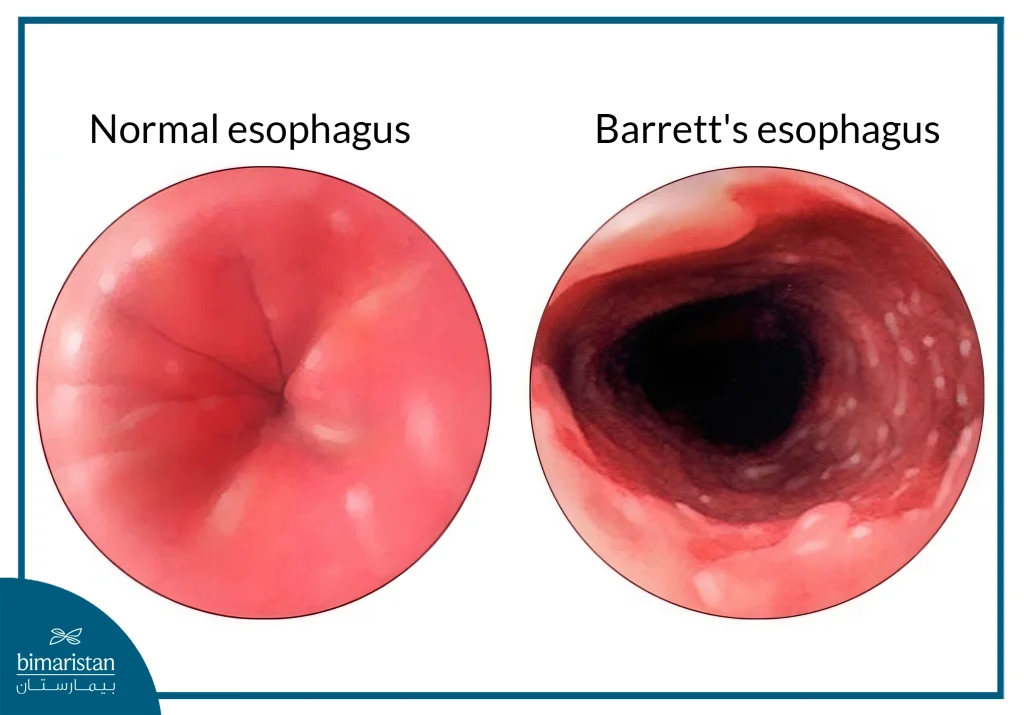The esophagus is a muscular tube that connects the throat to the stomach and plays a key role in digestion. Esophageal diseases are common disorders that affect quality of life and can cause serious complications if not diagnosed early. In this article, we highlight the most common esophageal diseases, their causes, and symptoms.
What is the esophagus, and what is its function in the body?
The esophagus is a muscular tube about 25 centimeters long that connects the throat to the stomach and transports food and liquids through waves of contraction and propagation, known as peristalsis. The esophagus begins with an upper esophagus consisting of voluntary skeletal muscle and gradually changes to smooth muscle in the lower esophagus, allowing for different control depending on the location. At the lower end is the lower esophageal valve (LES), a muscular ring that opens when swallowing and closes to prevent stomach acid from backing up into the esophagus. This valve at the gastroesophageal junction acts as a critical barrier to keep the lining of the esophagus safe from acid.
What are the most common esophageal diseases?
The esophagus includes a range of common diseases that affect its function in food transportation and acid balance, ranging from benign to life-threatening disorders:
Gastroesophageal reflux disease (GERD)
It is a chronic disorder that occurs when stomach acid repeatedly rises into the esophagus due to the failure of the lower esophageal valve to close. It differs from transient heartburn in that it is persistent, more severe, and often requires repeated treatment.
Esophagitis
Inflammation of the lining of the esophagus, often caused by gastric acid reflux (the most common cause), infection or allergic reactions, are types of esophagitis: Erosive (acid-induced), allergic (e.g. eosinophilic esophagitis) and infectious (often fungal (e.g. Candida) or viral (e.g. herpes), rarely bacterial), risk factors include gastroesophageal reflux disease (GERD) immunity and multiple other factors, and esophagitis causes symptoms such as pain and difficulty swallowing.
Esophageal stenosis
It is an abnormal narrowing caused by scar tissue after inflammation or surgery, and leads to difficulty swallowing and the sensation that food is stuck.
Barrett’s esophagus
It is a pre-cancerous condition in which a cellular change from squamous to columnar lining occurs as a result of chronic acid reflux and increases the risk of developing cancer.

Esophageal cancer
There are two main types of esophageal cancer: Squamous cell, which is associated with smoking and alcohol, and adenocarcinoma, which is often associated with Barrett’s esophagus and acid reflux, both of which are associated with smoking and are more common after the age of 60.
What are the causes of esophageal diseases?
Many different factors affect the health of the esophagus and contribute to the development of esophageal diseases:
- Poor dietary habits: Excessive consumption of fatty, spicy foods and carbonated beverages affects the function of the esophagus.
- Sedentary lifestyle: Increases obesity, which puts pressure on the stomach and esophagus, increasing reflux issues.
- Smoking and alcohol: Weaken the lower esophageal valve and increase irritation and damage to the lining of the esophagus.
- Genetic and immunological factors: They play an important role, especially in cases of allergic inflammation and esophageal infections.
- Certain immune conditions or health disorders increase the risk of esophageal disease
Symptoms of common esophageal diseases
Symptoms of esophageal disease vary depending on the type and severity of the condition, but there are common signs that warrant medical attention:
- Difficulty swallowing (dysphagia): This is one of the most common symptoms, especially in cases of inflammation or stenosis.
- Heartburn and pain behind the sternum: These are characteristic symptoms of acid reflux.
- Acid regurgitation: Stomach acid backs up into the throat, causing a sour or bitter taste.
- Chronic cough or chronic sore throat: Especially with frequent acid reflux at night and irritation of the upper esophagus.
When should I see a doctor?
See your doctor if you have warning signs of a potentially serious esophageal disease, including:
- Gradually increasing difficulty swallowing, which may indicate a narrowing or mass in the esophagus
- Unexplained weight loss is an important indicator of inflammatory or cancerous conditions
- Blood in your vomit or bloody sputum, which may indicate erosion or bleeding in the lining of your esophagus
Early diagnosis of esophageal disease is essential to avoid complications and improve the chances of effective treatment before the condition progresses.
Prevention of esophageal diseases is largely possible by adhering to a healthy lifestyle. Balanced nutrition, avoiding fatty and spicy foods, and avoiding smoking and alcohol contribute to minimizing the risk of injury. Maintaining an appropriate weight and regular physical activity also help reduce stomach pressure and prevent acid reflux. It is important not to ignore persistent symptoms such as heartburn or difficulty swallowing and to see a doctor immediately, as early diagnosis and appropriate treatment are essential to prevent complications and avoid the development of chronic or malignant esophageal diseases.
Sources:
- Smith, J., & Doe, A. (2015). Understanding esophageal diseases: A comprehensive review. Journal of Gastroenterology, 50(2), 123-135
- National Library of Medicine. (n.d.). Esophagus disorders. MedlinePlus.

